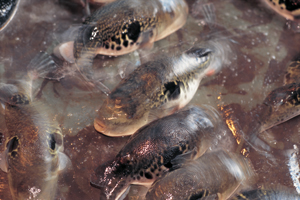Not Quite Your Last Supper
Back to Contents of Issue: February 2004
|
|
|
|
by Michael E. Stanley |
|
|
Yes, the Japanese do eat pufferfish, at least the edible and non-toxic parts of a number of species. And yes, if you do ingest even a bit of the really toxic organs or body parts, you stand a chance of having your bodily functions gradually shut down while you are still conscious and fully aware of what is happening. Some researchers have ventured the conclusion that tetraodotoxin -- puffer poison -- is used in Caribbean voodoo rituals to induce a deathlike trance from which the legends of zombies originated.
However, fugu is widely available in Japan; the barely-flavored sashimi of the most expensive variety, torafugu, is regularly served at Japanese banquets, and smaller varieties are prepared locally. It will probably surprise many Americans to learn that during World War II, de-poisoned species of Atlantic Ocean puffers were marketed as "sea squab."
But in both Japan and the US, death by firearms, automobiles, substance abuse and patriotic fervor is far more common than puffer poisoning. These cannot compete with the idea of diners in the know tucking into a seafood supper that supposedly may be their last. Quite a few foreigners of my acquaintance have breathlessly told me of a Japanese banquet at which fugu sashimi was served and how they bravely chanced their own demise to partake. In reality, the taxi ride home from the party was far more dangerous.
Still, let's look at the dark side. Every year a few individuals do indeed die of fugu poisoning, but none of them from the restaurant-served sashimi, stewed or fried versions. What kills them is the liver of the torafugu, the ivory-colored bit that harbors the deadly toxin, depending on each particular fish and its diet. The flavor is magnificent, very much like a rich terrine des fruits de mer, but without any heaviness or oiliness. The delicate aftertaste is beautifully complemented by a karakuchi (dry) sake.
It is, however, absolutely illegal to sell the fugu liver or even prepare it for consumption. Excepting rare cases where someone manages to badger a chef into taking the risk of preparing the liver (a famous kabuki actor is said to have met his end that way in an elegant Kyoto eatery), it is usually amateurs who try their hands. When they fail, it makes the news. @ |
|
Note: The function "email this page" is currently not supported for this page.


 IF YOU STAY IN Japan long enough, you will get the chance to encounter all the timeworn cliches in one form or another. The alleged Japanese "fascination with death," as shown in the consumption of fugu, the legendary toxic pufferfish, is one of these.
IF YOU STAY IN Japan long enough, you will get the chance to encounter all the timeworn cliches in one form or another. The alleged Japanese "fascination with death," as shown in the consumption of fugu, the legendary toxic pufferfish, is one of these.




